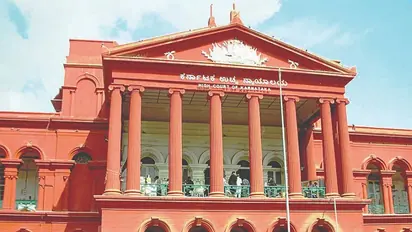Karnataka HC refuses to release seized Rs 14.3 lakh linked to accused PFI activist; Imposes fine on petitioner

Synopsis
The Karnataka High Court rejected an appeal to release ₹14.3 lakh seized from the home of an alleged PFI activist charged with terrorism, imposing a ₹10,000 fine on the petitioner. The court cited insufficient evidence of legitimate income and potential trial interference.
The Karnataka High Court has dismissed a criminal appeal seeking the release of Rs 14.3 lakh seized from the residence of a man identified as an activist for the banned Popular Front of India (PFI) and charged with terrorism-related activities. Filed by Sheikh Sadiq Ali, the father of the accused Sheikh Ijaz Ali, the petition also led to a Rs 10,000 fine imposed on the petitioner by the court.
The bench, led by Justices K.S. Mudagal and Vijayakumar A. Patil, ruled on the appeal after reviewing evidence and objections presented by Special Government Prosecutor P. Prasannakumar. The seized amount, totalling Rs 14.37 lakh, was confiscated by the KG Halli police during a raid connected to anti-terrorism investigations. Prosecutor Prasannakumar argued that the accused, Sheikh Ijaz Ali, had collected this money from various sources specifically to fund militant activities, and the investigators had supporting evidence to back this claim. He further warned that releasing the money would obstruct the trial process, as it could weaken the presentation of critical evidence.
Karnataka HC to take action against channels broadcasting court proceedings without consent
Sheikh Sadiq Ali, the petitioner, claimed the confiscated funds were not related to terrorism but were earned through the family’s flower and fruit sales business. However, the court noted that the affidavits submitted failed to provide specific details, such as dates and times of these transactions, and lacked sufficient documentation to substantiate the income.
'Surrender passport, don't contact witness': Karnataka HC's 7 conditions in actor Darshan's interim bail
Additionally, the court observed that any decision to release the seized money would prematurely interfere with the ongoing trial proceedings, essentially suggesting a ruling on the accused’s innocence ahead of the trial court’s final decision.
The High Court concluded that the petitioner did not produce adequate evidence to prove the legitimate origin of the funds and rejected the plea to return the amount.
Stay updated with the Breaking News Today and Latest News from across India and around the world. Get real-time updates, in-depth analysis, and comprehensive coverage of India News, World News, Indian Defence News, Kerala News, and Karnataka News. From politics to current affairs, follow every major story as it unfolds. Download the Asianet News Official App from the Android Play Store and iPhone App Store for accurate and timely news updates anytime, anywhere.